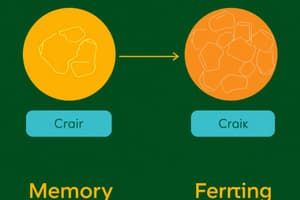Podcast
Questions and Answers
What aspect of memory did chess experts demonstrate a strong proficiency in during their evaluation?
What aspect of memory did chess experts demonstrate a strong proficiency in during their evaluation?
- Procedural memory for chess strategies
- Episodic memory for non-chess-related events
- Impression management related to personal relationships
- Semantic memory for meaningful chess games (correct)
Which group showed a negative rating after a one-hour delay?
Which group showed a negative rating after a one-hour delay?
- The one-month delay group
- The one-hour delay group (correct)
- The immediate rating group
- The group with no delay
Based on the conclusions drawn, what is suggested about episodic memory?
Based on the conclusions drawn, what is suggested about episodic memory?
- It is superior to semantic memory in all domains.
- It may exist to allow updates based on new information. (correct)
- It is not necessary for social interactions.
- It solely functions for recalling past experiences.
What conclusion was reached about the memory capabilities of chess experts relative to meaningless games?
What conclusion was reached about the memory capabilities of chess experts relative to meaningless games?
What concept is implied by the idea that experts have semantic memory in chess?
What concept is implied by the idea that experts have semantic memory in chess?
What is one likely characteristic of the one-month delay group in terms of memory?
What is one likely characteristic of the one-month delay group in terms of memory?
What memory theory is associated with the findings about episodic and semantic memory in this context?
What memory theory is associated with the findings about episodic and semantic memory in this context?
What is the purpose of spatial metaphors in understanding memory?
What is the purpose of spatial metaphors in understanding memory?
What aspect of memory does Ebbinghaus’s work primarily focus on?
What aspect of memory does Ebbinghaus’s work primarily focus on?
Which type of memory is NOT classified as a component of declarative memory?
Which type of memory is NOT classified as a component of declarative memory?
Which of the following best differentiates between 'remembering' and 'knowing' according to Tulving?
Which of the following best differentiates between 'remembering' and 'knowing' according to Tulving?
What did Bartlett's 'War of the Ghosts' study demonstrate about memory?
What did Bartlett's 'War of the Ghosts' study demonstrate about memory?
What type of memory is primarily assessed when evaluating episodic memory in the Susan Bower study?
What type of memory is primarily assessed when evaluating episodic memory in the Susan Bower study?
What is the primary difference between implicit and explicit memory?
What is the primary difference between implicit and explicit memory?
In what way do chess masters typically utilize episodic and semantic memory?
In what way do chess masters typically utilize episodic and semantic memory?
How do memory capabilities of chess experts typically differ from those of non-experts in terms of strategic plays?
How do memory capabilities of chess experts typically differ from those of non-experts in terms of strategic plays?
What does the phrase 'memory is an effort after meaning' emphasize in memory studies?
What does the phrase 'memory is an effort after meaning' emphasize in memory studies?
Which model of memory did Atkinson and Schiffrin propose?
Which model of memory did Atkinson and Schiffrin propose?
What was Ebbinghaus's primary contribution to the field of memory?
What was Ebbinghaus's primary contribution to the field of memory?
In the context of memory, what is a key distinction between implicit and explicit memory?
In the context of memory, what is a key distinction between implicit and explicit memory?
What conclusion can be drawn regarding the nature of memory based on modern theories?
What conclusion can be drawn regarding the nature of memory based on modern theories?
What does the phrase 'memory is an effort after meaning' suggest about the process of memory?
What does the phrase 'memory is an effort after meaning' suggest about the process of memory?
Which researcher is known for the concept that memory involves encoding, storage, and retrieval of information?
Which researcher is known for the concept that memory involves encoding, storage, and retrieval of information?
What was the primary focus of Ebbinghaus's studies in memory?
What was the primary focus of Ebbinghaus's studies in memory?
In the study of memory, what does Bartlett's 'War of the Ghosts' exemplify?
In the study of memory, what does Bartlett's 'War of the Ghosts' exemplify?
Which statement best describes the contributions of modern memory theories?
Which statement best describes the contributions of modern memory theories?
What does the term 'memory is an effort after meaning' imply about the nature of memory processing?
What does the term 'memory is an effort after meaning' imply about the nature of memory processing?
Which aspect of memory theory did Atkinson and Schiffrin primarily develop?
Which aspect of memory theory did Atkinson and Schiffrin primarily develop?
According to Ebbinghaus's findings, what can be inferred about memory retention over time?
According to Ebbinghaus's findings, what can be inferred about memory retention over time?
What was a significant contribution of Bartlett's 'War of the Ghosts' study to understanding memory?
What was a significant contribution of Bartlett's 'War of the Ghosts' study to understanding memory?
In the context of memory theories, which statement accurately differentiates between episodic and semantic memory?
In the context of memory theories, which statement accurately differentiates between episodic and semantic memory?
What does modern memory theory propose as the primary stages involved in the process of memory?
What does modern memory theory propose as the primary stages involved in the process of memory?
Which aspect did Bartlett emphasize when analyzing the 'War of the Ghosts' study?
Which aspect did Bartlett emphasize when analyzing the 'War of the Ghosts' study?
What is a significant conclusion drawn from Ebbinghaus's research on memory?
What is a significant conclusion drawn from Ebbinghaus's research on memory?
How does the statement 'Memory is an effort after meaning' primarily relate to the understanding of memory processes?
How does the statement 'Memory is an effort after meaning' primarily relate to the understanding of memory processes?
Which of the following best describes Ebbinghaus's transition from philosophy to psychology?
Which of the following best describes Ebbinghaus's transition from philosophy to psychology?
What type of memory did normal people most likely use in the mirror study?
What type of memory did normal people most likely use in the mirror study?
Why were amnesiac patients able to do just as well at the mirror reading task?
Why were amnesiac patients able to do just as well at the mirror reading task?
What type of memory did the amnesic patients use to remember the word when given the first 3 letters?
What type of memory did the amnesic patients use to remember the word when given the first 3 letters?
Flashcards
Chess Expert Memory
Chess Expert Memory
Chess experts have superior memory for chess games compared to meaningless games, due to semantic (meaning-based) memory for chess.
Episodic Memory
Episodic Memory
Memory that allows updating of impressions based on new info.
Semantic Memory
Semantic Memory
Memory for facts and general knowledge, like the rules of chess.
H.M. Case Study
H.M. Case Study
Signup and view all the flashcards
Ebbinghaus (1885)
Ebbinghaus (1885)
Signup and view all the flashcards
Modal Model
Modal Model
Signup and view all the flashcards
Bartlett's War of the Ghosts
Bartlett's War of the Ghosts
Signup and view all the flashcards
Types of Memory
Types of Memory
Signup and view all the flashcards
Modal Model
Modal Model
Signup and view all the flashcards
Sensory Store
Sensory Store
Signup and view all the flashcards
Working Memory
Working Memory
Signup and view all the flashcards
Long-term Memory
Long-term Memory
Signup and view all the flashcards
Ebbinghaus's Forgetting Curve
Ebbinghaus's Forgetting Curve
Signup and view all the flashcards
War of the Ghosts Experiment
War of the Ghosts Experiment
Signup and view all the flashcards
Episodic Memory
Episodic Memory
Signup and view all the flashcards
Implicit Memory
Implicit Memory
Signup and view all the flashcards
Explicit Memory
Explicit Memory
Signup and view all the flashcards
Chess Master Memory
Chess Master Memory
Signup and view all the flashcards
Episodic and Semantic Memory
Episodic and Semantic Memory
Signup and view all the flashcards
Memory Types Connection
Memory Types Connection
Signup and view all the flashcards
LTM
LTM
Signup and view all the flashcards
Memory is a process
Memory is a process
Signup and view all the flashcards
Effort After Meaning
Effort After Meaning
Signup and view all the flashcards
Ebbinghaus (1885)
Ebbinghaus (1885)
Signup and view all the flashcards
Bartlett's 'War of the Ghosts'
Bartlett's 'War of the Ghosts'
Signup and view all the flashcards
LTM
LTM
Signup and view all the flashcards
Ebbinghaus (1885)
Ebbinghaus (1885)
Signup and view all the flashcards
Bartlett's 'War of the Ghosts'
Bartlett's 'War of the Ghosts'
Signup and view all the flashcards
Memory process
Memory process
Signup and view all the flashcards
Effort After Meaning
Effort After Meaning
Signup and view all the flashcards
LTM
LTM
Signup and view all the flashcards
Ebbinghaus (1885)
Ebbinghaus (1885)
Signup and view all the flashcards
Bartlett's 'War of the Ghosts'
Bartlett's 'War of the Ghosts'
Signup and view all the flashcards
Memory is a process
Memory is a process
Signup and view all the flashcards
Effort After Meaning
Effort After Meaning
Signup and view all the flashcards
LTM
LTM
Signup and view all the flashcards
Ebbinghaus (1885)
Ebbinghaus (1885)
Signup and view all the flashcards
Bartlett's 'War of the Ghosts'
Bartlett's 'War of the Ghosts'
Signup and view all the flashcards
Memory is a process
Memory is a process
Signup and view all the flashcards
Effort After Meaning
Effort After Meaning
Signup and view all the flashcards
Study Notes
Types of Memory
- Memory is not a single entity, but rather a collection of interacting systems.
- Spatial metaphors are used to understand memory (capacity, duration).
- Atkinson & Shiffrin's Modal Model proposes separate memory stores (sensory store, working memory, long-term memory).
- Short-term store (STS) and long-term store (LTS) are functionally independent, and can be dissociated clinically.
- Long-term memory has different subtypes: episodic, semantic, and procedural.
- Episodic memory involves personal experiences ("remember").
- Semantic memory involves facts and general knowledge ("know").
- Procedural memory involves skills and habits (implicit knowledge).
Some Experiments in Memory
- Ebbinghaus's CVCs study revealed rapid forgetting, exhibiting a forgetting curve.
- War of the Ghosts study by Bartlett showed that memory is constructive, not a precise reproduction. People interpret information and fill in gaps based on prior knowledge, resulting in distortions and modifications compared to the original.
- Chess Master Study: Chess experts showed superior memory for meaningful chess positions, proving that skill and experience contribute significantly to memory performance.
- Susan Bower study: People show biases in remembering details of an event which is influenced by whether recalling these details in the short-term or long term after an event. Episodic memory allows for updating impressions of people based on new information.
Additional Information
- Memory can be both unitary and may have multiple components.
- Clinical studies have shown memory can be disrupted or altered, even in specific areas, suggesting its components are dissociable.
- Researchers like Bartlett studied how people reconstruct memory, creating an outline of reconstructive memory.
- The Modal Model of Memory has many assumptions. It is a model often referred to in memory research.
- Ebbinghaus, 1885, provided key findings regarding memory.
- Research and models like Atkinson & Shiffrin's Modal Model, Bartlett's work, and Bower's work provide varying perspectives on the nature and function of memory.
Studying That Suits You
Use AI to generate personalized quizzes and flashcards to suit your learning preferences.



